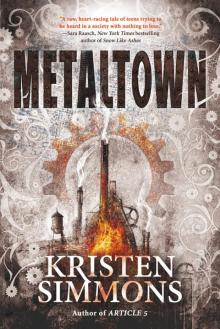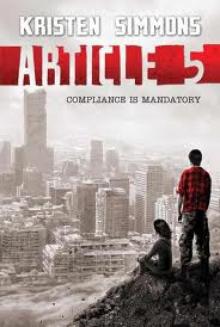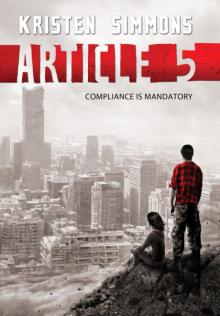- Home
- Kristen Simmons
Pacifica
Pacifica Read online
Begin Reading
Table of Contents
About the Author
Copyright Page
Thank you for buying this
Tom Doherty Associates ebook.
To receive special offers, bonus content,
and info on new releases and other great reads,
sign up for our newsletters.
Or visit us online at
us.macmillan.com/newslettersignup
For email updates on the author, click here.
The author and publisher have provided this e-book to you without Digital Rights Management software (DRM) applied so that you can enjoy reading it on your personal devices. This e-book is for your personal use only. You may not print or post this e-book, or make this e-book publicly available in any way. You may not copy, reproduce, or upload this e-book, other than to read it on one of your personal devices.
Copyright infringement is against the law. If you believe the copy of this e-book you are reading infringes on the author’s copyright, please notify the publisher at: us.macmillanusa.com/piracy.
FOR THE WOMEN WHO TAUGHT ME TO BE STRONG:
MY GREAT-GRANDMA,
HARU,
MY GRANDMA,
MURIEL CHIYO,
AND MY MOM,
ANN KIYO
AUTHOR’S NOTE
This story is personal, not just because the characters have lived so long in my mind, but because their world is rooted in my history. Their adventures are framed by my interpretation of the stories passed down to me through the generations. In that way, Pacifica does not begin with an exiled pirate girl, a relocated Shoreling, and the son of the president, but with my great-grandmother.
This is a story that begins in World War II, and like Marin, Ross, and Adam’s story, it’s about relocation, only then it was called internment.
Its start is marked on December 7, 1941, when the Japanese bombed Pearl Harbor, killing over two thousand Americans. During that time, 160,000 people in Hawaii were Japanese—either born in Japan (issei) or the first generation born in the United States (nisei)—and made up 37 percent of the population. They worked for the sugar and pineapple industries, or as fishermen, in the lumber yards, or in restaurants or schools. Most lived a blended culture—Japanese and American drawn into one. Despite this, racial tension had existed for some time (exclusion acts had been passed since the 1800s attempting to stop the influx of Asian immigrants), and when World War II began, racial prejudice combined with the hysteria of war to create a dangerous situation.
A few months after the bombing of Pearl Harbor, in February 1942, President Franklin D. Roosevelt signed Executive Order 9066, declaring military zones in the United States where certain people could be excluded based on their perceived threat to security. These zones included much of the West Coast (California, Oregon, and Washington). It called for the forced removal and imprisonment of “all persons of Japanese ancestry both alien and non-alien,” including both Japanese nationals and their children. Information on where Japanese could be found was given to the military by the U.S. Census Bureau, something that was not proven for almost sixty years. Those not interned fled, or were forced to observe curfews. Many lost their jobs, and were called “yellow japs” or “bananas” (yellow on the outside, white on the inside) by those they’d considered friends. The executive order came after hundreds of issei community leaders had already been incarcerated in Hawaii—my great-grandmother included.
Haru Tanaka had raised her American-born children in Hawaii, and was there on the Sunday morning when Pearl Harbor was bombed. She watched the planes painted with the Rising Sun fly overhead, thinking they were part of the American military’s training exercises. It was not until one fell from the sky into a nearby house, and shouts of “Senso [war]!” rang out, that she knew it was real. She worried for her daughter—my grandma—going to an art college in Tokyo, and for her son in Honolulu. She didn’t have a chance to tell them where she was going before the FBI showed up at her house that afternoon, moving her at gunpoint to an immigration station in Honolulu. Later, she would find out she had been watched by the government for years because she held a prominent position in the community—as principal of a school that taught Japanese language and martial arts to children. She’d taken over the position when her husband had died, years earlier.
She was held at that center for two months for her own “safety,” without a change of clothes, before being moved to a camp on Sand Island in Hawaii, and then to a girls’ reform school, converted to an internment center, in Dallas, Texas. She had no contact with the outside world or her children, and no idea what would come. For a year, she lived in that dusty climate, with scorpions and snakes, until she was finally moved to an internment camp in Crystal City, Texas. There, she lived on food rationing, seasoning rice with leftover coffee grounds and traded packets of sugar to make a kind of teriyaki. She received censored letters from her children, and bathed under supervision. She completed loyalty questionnaires, assessing her dedication to the United States. She began teaching art classes to teens, and Japanese to the nisei who had never learned it, so that they could be prepared when they were sent to Japan through a war exchange program.
She survived. And four months after the war ended, she returned home to find her house confiscated and the school where she’d worked sold, her son serving in the U.S. Army, and her daughter’s citizenship revoked, making her unable to come home from Tokyo.
Nevertheless, she persisted.
She rebuilt her life in Hawaii, and was one of the first of the 120,313 internees from 1941 to 1946 to receive reparations from the government for her time in the camp (she donated it to charity). She returned to teaching. She practiced kendo and other martial arts. Haru lived alone until she was ninety-seven years old, and passed away surrounded by family at the age of 102. She lived the kind of life you write stories about.
In Pacifica, my great-grandma’s experiences are reflected in the world Adam, Ross, and Marin live in. The relocation of the Shorelings was inspired by the internment of the Japanese, moved for their “safety” and others, to a new place, a Pacifica of sorts. A prison without any communication with the outside world. Adam, like the other Shorelings, lives with prejudice not unlike that my family faced. He was taken because of the way he looked and dressed, a product of the madness that comes from fear, and the dangers of racial profiling. The Shorelings line up outside the relocation centers, where certain eligible people are identified, just as those in our world were brought to internment and immigration centers. I have to think that some people, like Hiro in Pacifica, trusted the government, and believed they actually would be safer somewhere else. I imagine that trust was short-lived.
Like my grandma and great-uncle, Ross goes in search of his chosen family, Adam, finding the path more twisted and the obstacles more difficult to overcome with every step. Like Marin, my great-grandmother found herself exiled from her people, making “tar” the way the internees assembled traditional meals from scraps and traded spices like faux teriyaki as currency. Like my grandma, Marin finds herself without citizenship, or home, when she returns to the island, and faces a dilemma so many Japanese must have encountered: align themselves with their people—her own brother, in Marin’s case—or turn against them, hope for something better in land that has already proven less than welcoming.
My great-grandmother once told a reporter, “Japanese do not show tears outwardly,” when asked about her time in the camp. Though I have heard no accounts of riots like those in Lower Noram, those scenes became my outward expression of the grief she must have felt being forcibly removed from her home and family. The setting of this story—a world post–polar ice cap melt—is also meant to represent the world Haru faced. A world where people we
re thrown together, where cultures clashed, where leaders like Píero and Ross’s father were ever prepared for war because of the inherent distrust that comes when so much is taken away. A world where the very ground beneath their feet had grown unsteady. It’s also a pull to the future, though. A combined projection from professional research and interviews with the EPA (before 2017) describing a world profoundly affected by climate change. Had I been removed from everything I loved, I imagine I would see the world as Ross, Marin, and Adam do, shaken by quakes and storms, and physically falling to ruin.
It is my hope, however, that the world doesn’t come to this, and that we learn from my great-grandmother’s story. That we choose love when hate is the most accessible option. That when we lose everything, we still hold on to what we know, and teach it to others. That we survive together—an Alliance, not a division.
ADDITIONAL READING
Ishimoto-Morris, Mary. “Five Books on the Japanese American Internment.” Washington Post, June 4, 2009.
Ishizuka, Karen. Lost & Found: Reclaiming the Japanese American Incarceration. Chicago: University of Illinois Press, 2006.
Kaizawa-Knaefler, Tomi. Our House Divided: Seven Japanese American Families in World War II. Honolulu: University of Hawaii Press, 1991.
Takemoto, Paul. Nisei Memories. Seattle: University of Washington Press, 2006.
CHAPTER 1
WHEN MARIN was twelve years old, her father told her two things. The first was that there were two kinds of people in this world: ones that stabbed you in the chest, and ones that stabbed you in the back. She’d thought this was some kind of riddle, and asked about the ones who stabbed you in the side, or even the leg. Surely there was a third category for people who aimed for your foot.
He’d laughed, a deep, proud sound she’d remember until the day she died, and told her the second thing—that there was no way around it. His little girl was a corsario. A pirate. Just like him.
She’d seen the truth in his blue eyes. Seen the open seas and the skies, built from the stories he’d whispered as she fell asleep at night. It was what she’d wanted all her life—to sail the ocean chasing adventure, a feather in his wing—and in that moment, her wish had been granted.
Then he’d placed a knife in her hand, a hooked silver blade with a gritty bone handle, turned, and pushed three men, bound and gagged, over the side of a boat.
CHAPTER 2
“MR. TORRES, how good to see you.”
Ross returned a warm smile to the secretary of trade, a recent addition to his father’s cabinet following the disastrous demise of the last one. Ross couldn’t remember the details, but there was something about an only partially accounted for rail shipment from one of the farming districts and a mistress from some companionship service in Lower Noram. His mother had hugged the man’s wife and told her it would blow over soon, and then spent the next four days on the comm telling anyone who would listen about the “scandal of the century.”
“Likewise,” said Ross. “I hope your family’s settling into your new home.”
“They are, thank you.” The man ran a hand over his smooth, almost shiny jaw, clearly contemplating his next words. People often thought they needed to watch what they said in front of Ross. The truth was it didn’t matter. His dad didn’t listen to him anyway.
“So,” said the secretary. “Only six days left until relocation. You must be so proud of your father’s hard work.”
George Torres’ Relocation Act—a five-years-in-the-making opportunity, as his dad called it, for five hundred Noram citizens to start fresh on a man-made, secret island near the Alliance seaboard—was the point of tonight’s gathering. The lottery for who would be chosen to go in the first wave was to take place within the hour.
“Absolutely,” said Ross. He was used to this kind of small talk. Since his father had started in politics when Ross was five, he’d been coached on the right things to say. The Moderate Party lines his father touted—Alliance citizens work hard to stand strong, and support self-sufficiency, individually and worldwide—were all part of his vocabulary, though he maintained only a surface knowledge of their meaning.
His eyes roamed around the room. At ten stories, the Natural History Museum was one of the tallest buildings east of the jagged cliff that split the Alliance’s capital city, Noram. It was a lightning rod for the superstorms that invaded the area for weeks at a time, a natural power generator whose electric ran on the energy it gathered from the clouds. The very idea of standing within it gave Ross the creeps.
He didn’t like storms. Never had.
“It’s unusual to find a leader so invested in the welfare of his people,” said the secretary.
Ross thought he caught a hint of sarcasm in the man’s voice, but it was hidden by a smile. Before he was forced to think of a shallow-but-clever answer, the lights dimmed. On the opposite side of the room, in front of a glass staircase leading to the second level, a screen lowered, drawing the attention of half the room.
“Ah, here it is now,” said the secretary, grabbing a flute of champagne from a server passing by.
A woman’s voice came through the speakers. “For too long our people have suffered, plagued by overcrowding, disease, and lack of work.”
A view of the old hospital, recently converted to a relocation center, filled the screen. Men and women stood in a line that rounded the block, carrying application packets for the clerks sitting behind tables. It was a staged image, of course. The relocation center was the meeting point for those who objected to relocation, and rioted nightly in Lower Noram. This picture only really worked if the people in line were holding baseball bats and screaming at the police.
“We have only just survived for too long. Now we must take the next step and thrive.”
The final image of the ad was of the island, oval in shape, blanketed by green, surrounded by blue. Not like Noram, where, unless it was storming, the skies were perpetually beige and hazy. The camera focused on a house with a cozy living area, already decorated with a two-seater couch and a painting hanging on the wall.
He didn’t see what people were complaining about. Last he checked, a place like this was a step up from most of the slums below the cliffline.
“Pacifica,” said the woman’s voice. “A new beginning.” A quick male voice followed up with, “Paid for by the Relocation Act. Relocation: a new beginning.”
The lights came back on as a woman took the podium beside the screen, offering a welcome only acknowledged by half the people in the room.
“Excuse me,” said Ross, waving at some invisible person in the corner before the secretary could ask him anything else. “It was good seeing you, sir.”
Dressed in a new suit made of cool, synthetic material, he fitted his broad shoulders through the small clusters of men and women in formal attire, making his way toward the glass staircase in the center of the room. There, the buffet was fully stocked with bite-sized hors d’oeuvres, but he wasn’t hungry. He’d been to three events this week alone to celebrate his father’s Relocation Act. They were all starting to blend together.
There was a sameness here, as if everyone had been created by an identical mold. Men in black suits joking about politics, women in shiny dresses with too much makeup. Everyone made the same dull small talk and pried for the same gossip. It never changed.
“Try to contain your excitement,” came a wry voice from beside him. “You’re causing a scene.” Ross turned to see Adam Baker, the vice president’s son, reaching for a tomapple—a hearty apple-tomato hybrid, the newest creation from Noram’s farming labs according to the overenthusiastic girl doing the serving.
Ross’s mood lifted. He painted a painfully wide smile on his face. “Mr. Baker! Delightful to see you. Positively stellar suit, young man. What is it? Recycled plastic?” He brushed the nonexistent dust off of Adam’s shoulder, noticing the red flower above his chest pocket. Most people here tonight were wearing them—they must have been significant to the Relocation A
ct somehow.
“Pancake, actually,” said Adam, bringing out the bass in his voice. “It’s a bit crumbly, but completely biodegradable. And if you get hungry, you can just take a bite right off the arm.”
Ross laughed overenthusiastically, then tilted his head forward. “If we don’t get out of here soon I’m going to bite off my own arm. I will literally chew it off.”
The gleam faded from Adam’s eyes. He turned his gaze to the plate of food, small samples balanced carefully one atop another. “Come on. It’s not so bad.”
Ross picked up a tomapple, eyeing it suspiciously. Next to Adam, he was tall, almost a head taller, and broader through the shoulders. Despite his family’s Latino ancestry, his skin was paler than Adam’s had ever been, like the others above the cliff who spent most of their time sheltered from the sun’s harmful, cloud-piercing rays. He was built like his father: slim, but with enough presence to demand attention. His eyes were cobalt blue, his hair dark brown and forever sticking out sideways like he’d just rolled out of bed. It was a combination that made him adorable to grandmothers, inappropriately intriguing to his mom’s friends, and irresistible to the girls at Center Academy.
“You don’t ever get tired of it?” he asked.
“Of what?”
“This,” said Ross, motioning to the room. “All of it. The benefits, and the campaigning, and the stupid school assignments.” He took a bite of the tomapple and cringed at the mushy texture. After forcing himself to swallow, he balanced the rest of the fruit on Adam’s full plate. “It’s exhausting. Can’t we just do something not boring for once?”
“I guess,” said Adam, in a way that seemed to mean, you’re intolerable.
Ross turned slowly, surveying the room again, noting the security guards who stood like statues by the exits and windows, and Adam’s parents, polished, but still noticeably different with their less formal attire and their tan skin. They seemed to be the only political pair not swamped by a circle of donors dying to have their voices heard, which could have had something to do with Adam’s father’s set scowl, and the way his mother kept shaking her head disapprovingly.

 Metaltown
Metaltown Three
Three Pacifica
Pacifica Burned Away
Burned Away Article 5
Article 5 The Glass Arrow
The Glass Arrow Breaking Point
Breaking Point Scammed
Scammed Article 5 a5-1
Article 5 a5-1 Breaking Point a5-2
Breaking Point a5-2